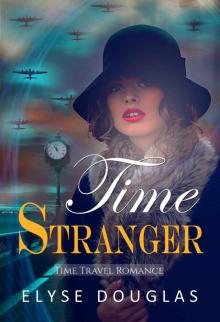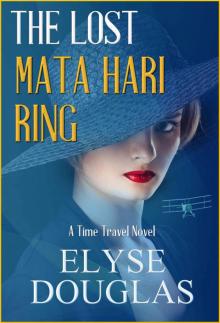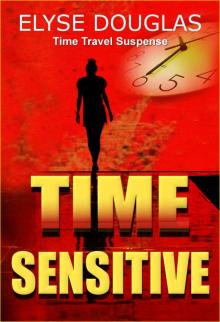- Home
- Elyse Douglas
The Lost Mata Hari Ring Page 10
The Lost Mata Hari Ring Read online
Page 10
Edward and Vadime had been badly shaken that first day, seeing so many of their friends go down in flames. New, inexperienced pilots arrived for breakfast, and Edward and Vadime wondered how many would be dead before dinner. They were both fighting fear, dread and depression.
On that bright Wednesday afternoon, Edward sat in the open cockpit of his Nieuport 11. He was positioned just behind and below the upper wing of the biplane’s wings, a machine gun fitted in the center of the upper wing.
A mechanic, with great hoops of sweat under the armpits of his gray coveralls, stood by Edward’s two-blade propeller, gripping it, waiting for the pilot’s command. When Edward displayed thumbs up, the mechanic gave the propeller a downward thrust. The 80-horsepower piston engine sputtered, coughed and shuddered to life, gray puffs of smoke billowing away.
Captain Vladimir Masloff was seated in the airplane to Edward’s left. His mechanic also turned a crank, sparking all the plugs. As the first pistons fired, the propeller slowly whirled and roared to life. The mechanics of both planes quickly yanked away the two-wheel chocks and backed away, out of the prop wash.
Moments later, their planes and eight other Nieuports bounced across the shimmering grass, ready for takeoff. Edward was dressed in sheep-skin high boots, warm pants, a white shirt, a leather coat and a motorcycle cap and goggles. He was wedged into the cockpit, hand on the control stick, running his water-cooled engine up for the usual two or three minutes.
Then he wrapped and tied his white scarf around his neck, flinging back its flapping tail. Edward wore the scarf for two reasons: his engine was prone to leak oil that could splatter on him, and rain and fog could accumulate, so his goggles had to be wiped clean.
Despite his fatigue, he grinned broadly at Vadime, more to bolster his courage than for dramatic flair, and enthusiastically returned Vadime’s thumbs up.
They were off on another sortie to meet the Germans. Edward turned his airplane into the wind and opened up the throttle. The plane crept forward, slowly, gathering speed, engine growling. Vadime was beside him, his face grim and determined. He also wore a leather cap and goggles.
To his relief, Edward could feel the roar of the engine pulling itself forward across the grassy field, every rib, strut and wire vibrating in unison. As the engine bit into the air, grass rippling in his engine wash, Edward was confident the mechanics had done a thorough job preparing his machine for yet another battle.
Edward met the lift of the plane with the gentle pressure of the joystick, and he raced down the field with Vadime close behind. The plane left the ground, dropped, bounced, surged up again and lifted over the tops of trees into the hazy, afternoon sky. At 500 feet, the ten biplanes gathered into formation and started toward the front lines, about 20 miles away.
The planes sailed over patchwork fields and farms, and the jagged rows of meandering trenches, where British soldiers lay crouched, tensed and waiting for the whistle blow to signal it was time to break from the trenches and charge the Germans, who waited in their opposing trenches with rifles, hand grenades and machine guns, aimed and ready. There would be much death and suffering, only minutes away.
The formation of biplanes slowly gained altitude, finally reaching 15,000 feet. As the squadron flew with about 20 to 30 yards between each airplane, Edward’s head was in constant motion, searching for the black specks that were enemy fighters. His plane swayed and danced in the gusting currents as he glanced over at Vadime and set the throttle, making sure he was in position for the attack.
Vadime lifted a hand and grinned, signaling he was ready for battle.
Ideally, Edward and the squadron wanted to be flying above the enemy, but nearly always, the German fighter planes were better machines and their pilots easily maneuvered them above, allowing them to attack in the glare of the sun.
Edward's plane, made of wood, wireframes and fabric, felt good under his control, his engine chewing up the air, his white scarf snapping in the cold, rushing wind.
Again, he glanced up and down, searching the sky for enemy planes. It took long practice and constant watchfulness to guard against a surprise air attack that could come from any point in the sky.
Edward suddenly jerked erect. There they were, ten or twelve black specks about two o’clock high, diving down on the Nieuports from out of the sun.
Edward waved at Vadime and pointed at the attacking enemy. He’d seen them too. Both pilots reacted fast. Edward banked left and dived, as two German Triplanes, one a yellow Fokker, the other a red Albatross, raced after him.
As the yellow Fokker closed in on him, Edward heard a burst of machine gun fire. He fell into a practiced maneuver, flying in a zig-zag course, making it hard for his enemy to shoot accurately. Edward felt the bullets whizz by his head and shoulders as he weaved and dipped, struggling to escape.
As a last resort, he pushed his airplane into a sharp dive—gaining speed—eighty-five, ninety, ninety-five. A hundred and five. It was now or never. Edward opened the throttle. Nothing happened. He cursed, shut it, opened it again. Finally, a sputter. A cough. The plane was screaming and vibrating like crazy. Would he be able to pull up? Uttering a silent prayer, he yanked back on his control stick. He broke the dive and shot up, wind rushing by, his breath coming fast. Had he shaken off the yellow triplane? Edward swiveled around with wild triumph, watching as his yellow adversary fell away, already closing in on another target.
Edward had barely survived the attack and the dive, and despite the frigid air, he was sweating, his heart kicking in his chest.
After gathering himself, Edward found a German Albatross—a bold black cross painted on the side of its fuselage. He dived, zooming in after it. As the distance between them narrowed, the plane grew large in Edward’s sights. The German pilot must have seen Edward’s approach. He began to circle, ten times to the left, ten to the right. Edward and the German danced, dived, swayed, struggling to get behind and above the other. Edward realized his opponent was no beginner. This was a skilled and experienced pilot, maybe even a German Ace, with many kills.
The sky became filled with airplanes in a free-for-all, life-and-death struggle, all diving and twisting, picking targets and firing 30 or 40 rounds in quick, lethal bursts. Every pilot was taut and alert, twisting around to ensure no one was on his tail, lining up to fire at him as he fired at the airplane in his sites. There was no time to focus. It was just snap shooting—a burst here—dive away, check your rear, find another veering, weaving target, fire another burst. Run. Dive.
All the flying formations soon fell into chaos, as planes dived and wheeled, as pilots fought for their lives. Planes approached head-on, guns blazing, planes diving on the tails, both sides locked in mortal combat.
Edward watched an Albatross chasing a Nieuport. A quick burst from the enemy punctured the Nieuport’s gasoline tanks. The plane burst into flames, shot up, corkscrewed away and then plunged to the Earth.
Edward felt an icy terror. Was that Vadime? Edward had no time to think. Two Germans were lining up on his tail. Edward threw his plane into a dive, as bullets zipped past his head, chewing into the fabric of his left wing. Still they pursued him, guns blazing.
He knew it often took only five or six rounds to down an enemy aircraft, so he took evasive action and hoped a bullet didn’t find him. He craned his neck, desperate to escape his pursuers. Battle was raging all around him and planes were taking hits, pilots killed, slumped over in their cockpits, their planes trailing smoke, tumbling from the sky.
Edward banked right and left, his eyes wide, the cold air rushing past his face. And then, as luck would have it, he spotted a heavy band of clouds just ahead. Still taking evasive action, he fled toward the clouds. Another burst of bullets ripped into his right wing, just as he entered the thick foggy protection of a cloud. Gulping in breath to cool his frayed, burning nerves, he grabbed the tail of his white scarf and desperately wiped his goggles clear. Lost in a white cotton world of peace, he heaved out a heavy sigh of relief.
Where had all those German planes come from? The British and French were greatly outnumbered—at least two-to-one. He continued to take in gulps of air to calm himself, to gather himself, to stop his throbbing fear.
Moments later, Edward broke through the clouds to the other side and blue sky returned. He twisted about, searching the skies. He’d lost the Germans, but as he gazed down and below, he saw that the battle was still raging on. He peeled off left, dropped to 3,000 feet and started back to join the fight.
The dogfight lasted 20 more minutes. Edward fought on at 300 and 400 feet until his ammunition was low, and his gun jammed. He searched for Vadime, and when he didn’t find him, he darted back up into the sky and ran for home.
Back at the airfield, he landed, taxied to a stop and cut his engine. Still shaking, he pushed out of the cockpit. When his mechanic hurried over, Edward jumped to the ground, peeling off his flying cap and goggles.
“Have you seen Captain Masloff? Did he make it back?”
The mechanic’s expression was grave. “Captain Masloff crashed about a mile away. Rescue left about ten minutes ago. I don’t know any more than that.”
“Which way?”
The mechanic pointed left. “As far as I can tell, he went down just over the trees near that farm we pass when we drive back from the pub.”
With his legs still shaking and his face slick with sweat, Edward bolted for his car, vaulted in and cranked the engine. He unraveled the white scarf from his neck, flung it into the back seat, and sped away into a cloud of dust.
CHAPTER 13
On Thursday afternoon, July 3, a telegram arrived at the Chateau Beaufort. Fabrice, the very upright butler with salt and pepper hair and a slight limp, delivered it to Mata Hari, who was languishing on a pink settee, reading a newspaper and sipping a glass of Champagne from a crystal flute.
She looked at Fabrice with a sudden, watchful anxiety. Hesitating, she finally lifted the telegram from the offered silver tray, reached for the gold letter opener, also on the tray, and sliced the envelope flap open. After a bracing pause, Mata Hari drew out the telegram and read it.
Outside, Trace was wandering along the stone pathways that led between thick trimmed hedges and flowering gardens. At the fish pond, she placed her hands behind her back and watched the orange and silverfish slither under lily pads and disappear into the shadowy depths.
She sat on a white marble bench, presenting her face to the sky, her eyes closed against the warming sun. She was fatigued and emotionally weary. Being on overload for days was taking its toll, as were the constant psychological and emotional shifts from present to past.
As Trace sat there resting, feeling the soft silky wind moving across her face, hearing glorious birdsong, she was comforted by the peace of it all, and by the gurgling sounds of nearby fountains. The air was cleaner in this time, there was no doubt about that. She’d noticed that from the beginning, while she took her first walk with Edward. The air was alive and caressing, the distant horizons so wonderfully in focus, the colors vibrant and exhilarating.
And she had also noticed that flowers smelled sweeter, food tasted fresher, the butter and bread seemed to sing with flavor, and the fruit exploded into ripe sweetness at the first bite. The coffee was dark and rich, without acidity, and the wine was simply the best she'd ever tasted.
Granted, Mata Hari demanded the most expensive clothes, food and wine, but even at that, Trace had noticed a dramatic difference. Despite the violence of war and the same volatile human emotions that plagued her time, the air, the food and the water were less damaged and polluted. The earth seemed healthier.
As Trace sat on the bench and experienced that simple peace, some of the cobwebs of her mind cleared and she was able to focus. The silence was heavenly—being far from the constant monitoring of her cell phone, the 24-hour bombarding news cycle, and all the cacophony of 21st century sounds assaulting her ears.
Inevitably, her mind returned to her problems. What was the way forward? Mata Hari had been good to her, and very generous. She had supplied her with clothes, shoes and jewelry and, on Trace's behalf, she had appealed to the Marquis for a passport for Trace. The Marquis, a portly, florid-faced man with a waxed white mustache, bushy eyebrows and a very bald head, had looked Trace over with obvious lusty pleasure, and then readily nodded his consent.
“I dare say, we can come up with something for the lovely girl,” he said.
He turned to Mata Hari, took her hand and kissed it. “How can I deny you anything, my dear Mata Hari, when you bring such extraordinary beauty and passion to my lovely chateau? Of course, I will do all I can to help this beautiful creature procure a passport. I have some influence at the American Embassy, and I am a friend of the Ambassador, Mr. William Graves Sharp. Why, only two weeks ago, I attended a dinner where he was in attendance. Yes, I’ll see what I can do.”
He turned back to Trace with an ingratiating smile. “You will have to go to Paris, to the American Embassy, but I think I can safely say we can arrange a passport for you. It may take time, of course. Nothing in France is hurried, especially these days, during this war.”
Trace had felt encouraged, but also skeptical that the Marquis really had so much influence. After all, in this time, Trace had no past, no birth certificate and no relatives, at least none that she was aware of.
That same night, after dinner, and after the Marquis had retired to Mata Hari’s bed, no doubt waiting anxiously for her to join him, the two women sat alone in candlelight. Mata Hari waited until the fruit tart was served and the coffee poured before she lifted her serious eyes, narrowing them on Trace.
“Are you spying for the Americans, Trace?”
Trace had just sipped coffee from her flowered demitasse cup. Stunned, she nearly spit it out.
“What?”
“You can tell me. It will be our secret.”
“No…No, of course, I'm not a spy.”
“Then what happened to your passport? Why do you need to get another?”
“I told you. I lost it someplace when I was performing near the front.”
“And I don’t believe you. You just happened to meet up with Edward in Paris at some bistro? No, I don’t think so. I saw how he stumbled and fumbled out his answer that first night. He was trying to cover for you and we both know it. I saw that frightened look in your eyes. I also saw him fall instantly in love with you—a first sight love. No, Edward had never seen you before, but you instantly captured his heart and, I dare say, his loins. I’m a lot of things, Trace, but I am not a fool. I have traveled all over Europe and have been with many men. I know all the looks of fear, the looks of lust, and the many looks of love. Edward had definitely never seen you before.”
Mata Hari tapped the ends of her fingers together, her eyes fixed on Trace. “So, that brings me to my next question. How did you get into this chateau, why were you dressed in that odd, erotic ensemble, and why didn’t you have a trunk or any clothes?”
Trace frantically searched for a plausible answer. No words came.
Mata Hari waited, fingers tapping. Finally, she reached for her demitasse. She took a dainty sip, two fingers shining with jeweled rings, not allowing her eyes to stray from Trace’s worried face.
“Did the Marquis’ son bring you here? I know it wasn’t the Marquis himself. He didn’t recognize you either.”
Trace was trapped. She couldn’t tell the truth, and she didn’t want to tell more lies. Mata Hari was sharply perceptive and intelligent, and although Trace was a good actress, she had to come up with some plausible answer, one that Mata Hari would believe.
“Something happened to me, Mata Hari. I don’t know what. That morning…when I arrived, I woke up on the back lawn, near the flower garden. I don’t know how I got there. I don’t remember how I got here.”
Mata Hari considered this, with some skepticism. “What is the last thing you remember?”
“Being somewhere in France, near a battlefield in my tent, trying
to fall asleep.”
Mata Hari shook her head, took another sip of her coffee and looked away.
When she faced Trace again, her jaw was fixed. “Then where did you get my ring? Tell me that. How was it that you were wearing my emerald ring?”
Trace was flummoxed. Her mind raced for an answer, and she could only come up with a flimsy one. “I found it lying on that white, marble-top pedestal table. The one near the piano. When I entered the room, sunlight flashed on it and it drew my attention.”
Not satisfied, Mata Hari searched Trace’s face. “That ring was in its proper silver jewelry case in my bedroom. I had not worn it in weeks. Your explanation makes absolutely no sense at all. In fact, what you say and who you are make no sense.”
Trace offered only a weak smile.
“I don’t know what to think of you, Trace. I have to say that you are the strangest woman I have ever met. You just seem to have dropped in from thin air. And you are different somehow. I can’t quite put it all together, but you seem both familiar and yet distant and frightening to me. Half of me wants to throw you out, and the other half of me wants you to stay. I’m just not sure I can trust you, and trust is a much-needed commodity during this dreadful war.”
“You can trust me,” Trace said. “Please believe that. You can trust me.”
As they returned to their dessert, Trace knew that Mata Hari wasn’t convinced.
Back on the marble bench with the afternoon sun on her face, and a chorus of birds in the nearby trees serenading her, Trace wasn’t surprised when Mata Hari approached, her footfalls striking the stone path in quick, surging steps, disturbing the peaceful afternoon.
Trace already knew what had happened. Captain Masloff had been wounded. She’d read about it before she’d arrived in the past. She’d also had vague memories and dreams about Vadime Masloff. There were many things about Mata Hari, her family and friends, and her life that Trace couldn’t recall, although she sensed that all those memories existed just below the surface of her conscious mind.

 The Christmas Women
The Christmas Women Time Stranger
Time Stranger The Lost Mata Hari Ring
The Lost Mata Hari Ring Time Sensitive
Time Sensitive The Christmas Eve Daughter - A Time Travel Novel: The Sequel to The Christmas Eve Letter
The Christmas Eve Daughter - A Time Travel Novel: The Sequel to The Christmas Eve Letter The Date Before Christmas: A Novel
The Date Before Christmas: A Novel